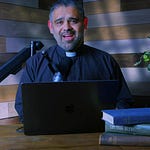Note: The hymn above was the closing piece to our 35th Wine and Psalm-roar (Christmas Edition). We had around 300 folks gather to sing 14 Christmas carols and enjoy the finest food and drink!
Merry Christmas!
While many today lament the materiality of Christmas, the late David Chilton wrote a remarkable article I read every year called Let’s Keep Christmas Commercialized. You can see how the title can be a little controversial in an age of sentimentalism. Chilton concludes that essay:
I rejoice in the commercialization of Christmas. It signals the one time in the year when our world approaches sanity. The brightly lit houses, the evergreens garlanded with bulbs, the carols that provide the musical background for even our most hectic shopping — all creation comes alive with the message that the shift from B.C. to A.D. changed the world forever.
Yes, we are celebrating the continuation of the feast, the triumph of commercialization, the goodness of stuff, and the blessedness of Christ, the fleshly King. In Christmas, to quote Athanasius:
“The Self-revealing of the Word is in every dimension - above, in creation; below, in the Incarnation; in the depth, in Hades; in the breadth, throughout the world. All things have been filled with the knowledge of God.”
Merry Symbols!
The Church has wisely given us this typology of 12 days from December 25th to January 6th. The 12 days serve as catechetical tools and biblical symbols of God's revealed Word. The 12 days are given so that we keep the feast.
12 tribes
12 apostles
12 gates
12 princes
12 baskets
12 priestly stones
12,000 x 12 = 144,000 sealed
12 days of Christmas to revel in what C.S. Lewis called “the Grand Miracle.” 12 days to declare that the uncreated, eternal, came into nature, human nature, and rose again on the third day, taking nature up to heaven with him.” It is the incarnation of Jesus that brought heaven down to us!
Merry New World
You are reading this on the 31st of December, but fundamentally, this is the seventh day of Christmas, when the Church continues to rejoice in the song of heaven and nature. Creation has been made new by history’s Creator and Composer in the flesh. Everything is fundamentally different. The way we love, care, eat, and drink has been enchanted and chanted by Bethlehem’s babish cries on Christmas morn.
We are no longer struck dumb and deaf like Zechariah; we are no longer a barren land; we are no longer under the reign of Adam’s curse. We live in the present reality of a supernatural universe where the stars guide the wise, the angels sing, tyrants are deceived, gifts are given, and earth receives her king.
Yes, we live in a world of miracles where, with God, all things are possible. We live in a world where the impossible takes place every day. Yes, Christians believe in miracles because the birth of Jesus is that fundamental miracle that makes all miracles possible.
We are not naturalists or skeptics; we are supernaturalists and believers in the God who made heaven and earth and was born of the virgin Mary. Indeed, Christmas can be summarized by saying, “For nothing is impossible with God.”
But unbelieving man lives with a different paradigm. He affirms that life has some meaning, but this meaning is limited to what we can verify with our microscopes and laboratory experiments. Only rationalism, they say, can answer our most profound questions. Only expertise and experts can provide the answer to life’s mysteries. However, Christians affirm something radically different. We look at the Virgin birth—very God of very God, begotten, not made—and rests our entire future in a singular day long ago in the city of David.
Merry God of Merry God
Christians affirm the impossible because nothing is impossible with God.
When God came to Abraham and told him he would have a child, Sarah laughed because such a thought was impossible. She is advanced in age, and her husband is old: “Shall I indeed bear a son now that I am old?” And Yahweh said, “Is anything too hard for me?” Translated, “Is any deed too miraculous for Yahweh?” “Is any deed outside the realm of his power?”
Later, the Angel Gabriel comes to Zechariah, and the same narrative repeats: “How can Elizabeth have a son? We are well advanced in years.” When John is born, the angel interjects again with the same answer: “For with God, nothing will be impossible.”
And now you begin to see a pattern emerging in the Scriptures. It’s a pattern because it’s the kind of thing we sometimes struggle to believe. Human beings are tentative about the impossible in their best moments but doubtful of the impossible in their worst moments.
But the Christmas story calls us to defy doubt and puts the miraculous at the forefront. It catapults the impossible to a place of prominence. We celebrate that God left his exalted state to enter into a humbled throne to rule the world with truth and grace.
This Christmastide is the time to accept that the miraculous became ordinary and that the divine became human without forsaking the divine. Christmas is to believe something mysterious but marvelous in the sight of angels and archangels and all the company of heaven. If we doubt the presence of the God/Man in a cradle, then we will doubt the glorification of the God/Man on the third day in an empty tomb. It all rests on whether we believe that all things are possible with God.
As Greg Bahnsen once stated, “The glory of the Christmas story is the heart of Christian theology.” If we succumb to rationalistic theories that the miraculous cannot occur, everything goes to waste; our faith is in vain, and we walk by sight.
But with creedal certainty, this Christmastide, we believe in the God of the impossible who received a physical body at birth and who gave that physical body at death and who was raised in a physical body at the resurrection and who ascended in a physical body and who sits at the right hand of the Father in a physical body and who shall come again to judge the living and the dead in a physical body and who will resurrect humanity in a physical body and dwell with us in a physical body for all eternity.
So, yes, we believe that he was conceived of the virgin Mary, and that act is a miracle that makes creation a recipient of miracles both now and forever. If Jesus entered this world in human flesh, then human flesh can enter the world to come.
Losing My Internalized Religion
Now, let me make a Christmas statement that is bound to provoke pietism and Gnosticism to wrath: Christians boast in a material Christ, and therefore we believe in the good of the material.
Christians affirm the reality of Christmas in all of life. Christmas is supernatural; therefore, we reject Gnosticism as a system and dualism as a premise. These ideas undergird the separation between spiritual and physical. You may say: “But no true Christian denies the material nature of Jesus and no true Christian denies that God created the world, and no true Christian denies that the God of the Old Testament was the True God.” This is true. But how many Christians have bought into an intellectualized faith that treats the Gospel as some secret knowledge? How many Christians have tried to separate the soul and the body in how they think and live? How many Christians have tried to separate Christ from this world by saying that Christ is really not concerned about this world because this is a material world, and Christ is only concerned about the spiritual world? How many Christians affirm that God created the world, while openly singing that this world is not our home and that we are just passing through? Christians today may deny Gnosticism as a system but drink from the Gnostic fountain daily.
We tend to internalize religion. It’s about how we feel. It’s about our private time with Jesus. It’s about our personal meditation. Internalizing religion or our faith is the opposite of what the Incarnation teaches. The Gospel is public news. We embrace a public Christ who became a public man for us and our salvation.
Christians believe in the God of the impossible who turned the material world into the home of a material Lord born on Christmas morn.
The Materiality of Christmas on Display
So, we need a faith that does not doubt what God has made known. We need a faith that displays the realities of Christmas throughout the year. So, as we move into these remaining days of Christmas, I wish to encourage you in a few ways:
First, we accept the material in our view of the world. To believe that the material is good is not to believe in materialism, which is that only the physical matter is the true reality. No. Christians believe in a spiritual world also. We embrace both, but we affirm the good of the material because it is distinctly Christian. There are various traditions during the twelve days that can be beneficial to bolster that Christian practice. However, we may practice them in our homes; what we don’t do is act as if giving material things is a bad thing. Christmas is tied up with gift-giving because God took upon himself a material body. That’s why we wait eagerly to unwrap those material things under the Christmas tree because it is a joyous display of life when we give gifts. It is better to give than to receive, and so Christians ought to be the most material of beings, cherishing the happiness of others through gifts and providing tangible experiences of Christmas festivity with others around good food and drink and song.
Second, we become creedal in our view of the world. The gods of wokeness have taught us that Christian history needs to be rewritten to reflect the evolution of society. But the God who reveals himself in the Scriptures is the God of the impossible. He does not change his reality or revelation. His Word and Law are a mirror of his character. They are unchanging because God is unchanging. What the Creeds of the Church teach—Apostle’s Creed, Nicene, and others—is that to affirm that Jesus was born of a Virgin Mary is a precondition for authentic faith. We believe in the Virgin birth because it’s the foundation of our Christian identity.
The Creeds give us a miracle-guide to the revelation of God. We are poorer when we set it aside; we are more prone to error when we treat them ignorantly; so, confess at your dinner tables, with your children, and with your life the truths of the Holy Church. The Creeds testify that God took the impossible things of this world and made them possible with his mighty hand.
Finally, we become public in the world. We are too comfortable staying away from trouble. If Christmas teaches us anything, it’s that trouble finds the Christian. When we hide from our calling as Christians, we are hiding from the public truths of Christmas. Christmas set tyrants chasing after the holy family; it sparked prophetic fulfillment; it brought the angels into the public square, and the whole world immersed itself in doxology.
To be Christian is to be publicly present. It is also true that not everyone will be called to receive death threats or even lose a job over the Virgin birth. Still, we are called to be public enough to make those who despise Jesus uncomfortable with what we stand for, and we stand for a miraculous God who does the impossible. This all means that if you are hesitant or timid about your Christian presence in the public square, your witness will be the first to succumb to all sorts of cultural movements and pressures that oppose the Son of God.
We live in a world of miracles where, with God, all things are possible. And therefore, we must affirm the material as good, the creeds as standard, and the public life as a virtue.
Our 12 days of merriness continue! Merry Christmas and Happy New Year from the Perspectivalist!








